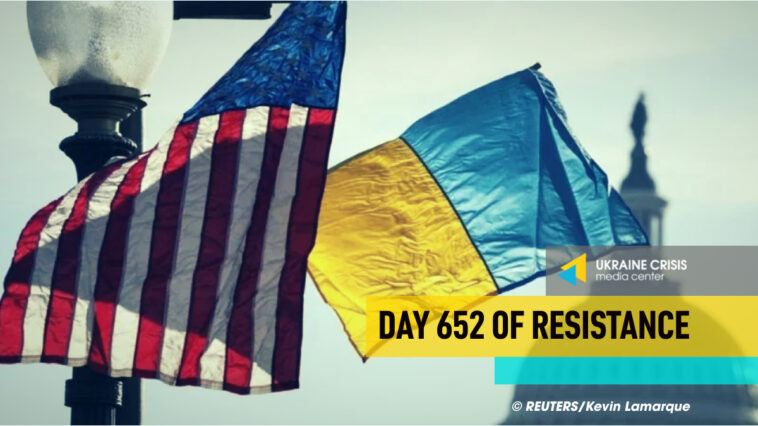New aid to Ukraine drops to the lowest levels since January 2022, a report says. Top U.S. security leaders meet with a Ukrainian delegation in Washington amid a dispute in Congress. Russia will hold its presidential election on March 17.
New aid to Ukraine drops to lowest levels since January 2022, report says
Newly committed military, financial and humanitarian aid pledged to Ukraine between August and October 2023 fell almost 90 per cent compared with the same period in 2022, according to data tracked by the Kiel Institute for the World Economy released on Thursday.
Fresh support fell 87 per cent between August and October from the the same period a year ago to EUR 2.11 billion (USD 2.3 billion). The amount was the lowest since January 2022.
The main remaining active donors are individual European countries, such as Croatia, Finland, Germany, Ireland, Lithuania, Luxembourg, the Netherlands, Norway, Sweden, and Switzerland, as well as NATO countries like Canada and the United Kingdom.
The U.S. remains the largest military donor, with total commitments of EUR 44 billion. But Germany is catching up fast, with total military commitments now exceeding EUR 17 billion, the Kiel Institute for the World Economy said.
When focusing on committed military aid, EU countries continue to catch up, and now surpassed the United States.
Of the total EUR 25 billion in heavy weapons committed between January 2022 and October 2023, the U.S. accounts for 43 per cent of the total value, while all EU countries and institutions together account for 47 per cent, with the remainder coming from various other donors, in particular the United Kingdom and Canada, the report says.
Top U.S. security leaders meet with Ukrainian delegation in Washington amid dispute in Congress
A high-level Ukrainian delegation is in Washington this week for a series of meetings with senior U.S. officials. Head of the Office of the President of Ukraine, Andriy Yermak, Speaker of the Ukrainian Parliament, Ruslan Stefanchuk, and Ukraine’s Defense Minister, Rustem Umerov met with U.S. Secretary of State, Antony Blinken, and U.S. National Security Advisor, Jake Sullivan on Thursday.
Umerov and Yermak met separately with U.S. Defense Secretary Lloyd Austin. Yermak and Stefanchuk also spoke to a group of Republican senators, the Office of the President said in a statement.
According to the statement, the conversations centered on the situation on the frontlines, Ukraine’s defense needs, security pledges to the country and President Zelenskyi’s peace formula.
Yermak told Blinken he was hopeful that the U.S. and Ukraine will soon discuss in detail U.S. proposals for a bilateral agreement that cements security guarantees, the statement reads.
On December 6, the Senate failed to move forward with a package that would have bolstered aid for Ukraine, Israel, Taiwan and other priorities.
On Wednesday, the White House said the U.S. was strengthening cooperation between the U.S. and Ukrainian defense industrial bases. Also, U.S. and Ukrainian government representatives signed an agreement to speed weapons co-production.
Zelenskyi was expected to remotely address a classified Senate briefing on Tuesday but canceled due to the “changing war situation”. Instead, Stefanchuk, Yermak, and Umerov met with the U.S. lawmakers.
Russia to hold presidential election March 17
Russia will hold its presidential election on March 17, following a vote in Russia’s upper house of parliament on Thursday.
Head of the Central Election Commission of Russia, Ella Pamfilova, said that for the first time in Russia’s modern history, the presidential elections are being held “in such a toxic geopolitical climate”.
The country’s election system “is durable enough to ensure that the presidential election is held properly,” she said.
On December 8, the Central Election Commission will consider a draft to extend voting over three days, Pamfilova added.
A decision will be made by December 12 on whether occupied Ukrainian territories will take part, the report said.
Polish Carriers and the Blockade of the Ukrainian Border. Ukraine in Flames #543
Since the beginning of Russia’s full-scale invasion of Ukraine, the western border of our сountry has become a real road of life, along which not only vital goods, humanitarian aid, weapons and ammunition are supplied to Ukraine, but also Ukrainian goods are exported to the world. On November 6, the blockade of Ukrainian trucks on this vital section of the border began, resulting in a sharp drop in cargo transportation. Carriers report staggering losses of 400 million euros within the initial two weeks of the blockade. Watch Ukraine in flames #543 to find out about the causes and outcomes of the Ukrainian border blockade by Polish carriers and explore the key players involved.
Guests:
- Pavlo Kravchuk, Expert of the NGO “Europe without barriers”
- Mykola Kniazhytskyi, People’s Deputy of Ukraine
- Hennadiy Chyzhykov, Head of the Ukrainian Chamber of Commerce and Industry




